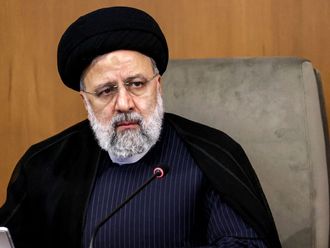Cairo: A group of government opponents and supporters are randomly arrested and crammed into a police van where they initially display feelings of hatred against each other.
Set in mid-2013, Eshtebak (Clash), an Egyptian film that was released to public screening late last month, dramatises the street unrest that gripped Egypt after the army’s toppling of Islamist president Mohammad Mursi following mass protests against his rule.
Despite tensions inside and outside the van, the film features moments of quietude and even comedy that transcend political prejudices. During these moments, characters representing Mursi’s Muslim Brotherhood and its detractors forget about their political leanings when they talk about music and football preferences.
Political polarisation also gives way to human compassion when one pro-government detainee is injured by a stray stone and an Islamist girl suffers for being unable to answer the call of nature inside the van.
Eshtebak is directed by Mohammad Diab, who has repeatedly said that his film is not about politics but “about human feelings”. Diab, 39, has accused the Egyptian censors of bias for insisting on putting a note that appears before the start of the film reading: “After the June 30 Revolution, the Brotherhood carried out bloody clashes in order to stop peaceful transition of power”.
June 30, 2013 was the day when street protests began in Egypt, demanding Mursi step down. Three days later, the army toppled and detained Mursi.
Since its screening at the Cannes Film Festival in May, Eshtebak has triggered uproar in Egypt.
A report on Egyptian state television accused makers of Eshtebak of “distorting” Egypt’s image and promoting a Western agenda as their work was partly financed by French and German institutions.
“How come you present your country from a paddy wagon and say you are Egyptians?” Ahmad Mousa, a staunch pro-government anchor, addressed makers of Eshtebak “on private Saada Al Balada TV station.
Some entertainment critics have praised the film, though.
“In my opinion, this is the best film shown so far in 2016, if not one of the best and most important Egyptian films produced in the last 10 years,” said Mahmoud Abdul Shakur.
“The film does not take the side of any political faction although it brings together representatives of all Egyptian currents inside a police truck. It more or less condemns everyone and defends humanity,” added Abdul Shakur, a critic in private newspaper Al Shoruk.
Cinema-goers are divided too.
“The film presents the police as oppressive although they were acting in reaction to the Ikhwan [Brotherhood]’s bloody violence and plan to spread chaos,” said Marwan Hani, a commerce student, after seeing the film at a Cairo cinema this week. “The Censorship Authority should take the credit for permitting the showing of the film without any cut despite its unbalanced approach.”
To Sarah Fouad, a law school graduate, the film goes beyond political violence.
“It tells us not to lose our humanity for politics,” she said. “The film does not take sides. It encourages us to accept each other’s views and warns against fanaticism and hysteria. This message is especially clear in the superb final scene when the police van turns over, putting lives of detainees inside — opponents and supporters of the regime — in danger.”










